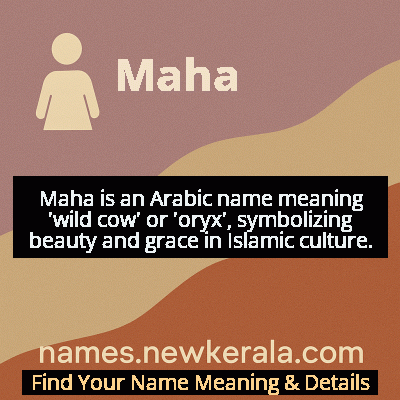Maha Name Meaning & Details
Origin, Popularity, Numerology Analysis & Name Meaning of Maha
Discover the origin, meaning, and cultural significance of the name MAHA. Delve into its historical roots and explore the lasting impact it has had on communities and traditions.
Name
Maha
Gender
Female
Origin
Muslim
Lucky Number
5
Meaning of the Name - Maha
Maha is an Arabic name meaning 'wild cow' or 'oryx', symbolizing beauty and grace in Islamic culture.
Maha - Complete Numerology Analysis
Your Numerology Number
Based on Pythagorean Numerology System
Ruling Planet
Mercury
Positive Nature
Adventurous, dynamic, curious, and social.
Negative Traits
Restless, impatient, inconsistent, prone to indulgence.
Lucky Colours
Green, white.
Lucky Days
Wednesday.
Lucky Stones
Emerald.
Harmony Numbers
1, 3, 9.
Best Suited Professions
Sales, marketing, travel, entertainment.
What People Like About You
Versatility, charisma, adventurous spirit.
Famous People Named Maha
Maha Al-Saati
Saudi businesswoman and philanthropist
Founder of multiple successful businesses and prominent women's empowerment advocate in Saudi Arabia
Maha Al-Mozaini
Medical researcher
Leading immunology researcher at King Faisal Specialist Hospital, known for work on autoimmune diseases
Maha Al-Muneef
Physician and activist
Executive Director of Saudi National Family Safety Program, recognized internationally for domestic violence prevention work
Maha Al-Mahmood
Poet and writer
Award-winning Emirati poet known for modern Arabic poetry collections exploring feminine identity
Name Variations & International Equivalents
Click on blue names to explore their detailed meanings. Gray names with will be available soon.
Cultural & Historical Significance
Throughout Islamic history, Maha has been associated with women of grace and dignity, often appearing in classical Arabic literature and poetry as a symbol of idealized feminine beauty that combines physical attractiveness with inner strength and resilience. The name's enduring popularity across centuries demonstrates its deep roots in Arab cultural identity and its successful transition into modern Islamic naming practices. In contemporary Muslim societies, Maha continues to represent a connection to cultural heritage while adapting to modern sensibilities, making it a bridge between traditional values and contemporary life.
Extended Personality Analysis
Women named Maha are typically associated with a blend of gentle strength and intuitive wisdom. They often possess a calm, nurturing presence combined with remarkable inner resilience, much like the wild cow the name references - graceful yet powerfully grounded. Mahas are frequently described as having deep emotional intelligence and empathy, able to understand others' feelings with remarkable clarity. Their 'cow-eyed' association suggests not just physical beauty but a certain depth of soul and perceptiveness in their gaze.
Many Mahas exhibit strong maternal instincts and protective qualities toward loved ones, creating stable, comforting environments for those around them. At the same time, they often demonstrate quiet determination and the ability to endure challenges with patience and grace. This combination of gentle exterior with inner strength makes Mahas particularly effective in caregiving roles, education, and leadership positions where emotional intelligence is valued. Their personality often reflects the balance between traditional values and modern adaptability, allowing them to navigate complex social situations with both wisdom and compassion. The name seems to attract or cultivate individuals who embody both traditional feminine virtues and contemporary strength.
Modern Usage & Popularity
In contemporary times, Maha remains a popular name across the Muslim world, particularly in Arab countries, Pakistan, and Muslim communities in Western nations. While maintaining its traditional appeal, the name has seen some evolution in usage patterns. In recent decades, Maha has become popular among educated, urban families who appreciate its cultural roots while finding it modern and elegant. The name consistently ranks among the top 100 female names in countries like Saudi Arabia, UAE, and Jordan. Interestingly, Maha has also gained some popularity in non-Muslim communities, particularly among parents seeking unique, multicultural names with beautiful meanings. Social media and global connectivity have contributed to the name's international recognition, with many young Mahas becoming influencers, professionals, and artists who bring contemporary relevance to this traditional name. Despite modernization, the name continues to be chosen primarily for its beautiful meaning and cultural significance rather than following naming trends, ensuring its enduring appeal across generations.
Symbolic & Spiritual Meanings
Symbolically, Maha represents much more than its literal translation of 'wild cow' or 'cow-eyes.' The name embodies the concept of natural beauty in its purest form - untouched, graceful, and authentic. The 'wild cow' symbolism connects to ideas of freedom, natural elegance, and untamed spirit, while the 'cow-eyed' aspect represents depth of soul, wisdom, and the ability to see beyond surface appearances. In many cultures, cows symbolize nourishment, motherhood, and the sustaining forces of nature, adding layers of meaning about provision and care. The large, dark eyes referenced in the name's meaning are traditionally seen as windows to the soul in Arabic culture, suggesting that Mahas possess deep spiritual insight and emotional perception. The name also carries connotations of patience and endurance, qualities associated with grazing animals in harsh environments. Metaphorically, Maha represents the balance between gentle nature and strong survival instincts, between traditional beauty and independent spirit. This rich symbolic tapestry makes the name a powerful choice that connects the bearer to natural wisdom, feminine strength, and cultural heritage.

